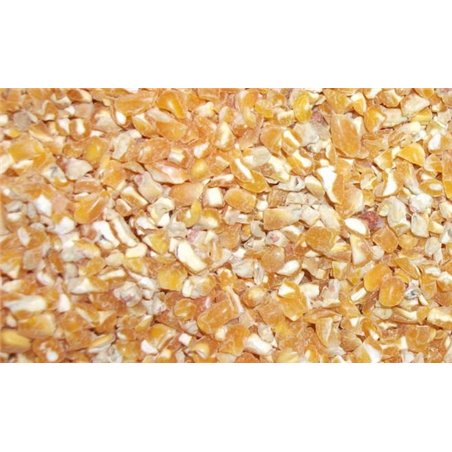





Corn tends to be lower in protein but a higher energy source than other grains. It is cracked or ground to improve digestibility.
Corn or maize is used in the diet of poultry, pigs, sheep and horses. Corn tends to be lower in protein but a higher energy source than other grains. It is cracked or ground to improve digestibility.
Avigrain use a unique slicing technique to cut the corn rather than crushing it using a rollermill or grinding the corn through a hammer mill.
Avigrain sliced corn has a more uniform kibble than traditional ‘cracked’ corn. The crushing process tends to end up with a bigger variety of particles – from whole grain to dust. Sliced corn is generally less dusty than corn which has been crushed or ground.
Corn or maize is used in the diet of poultry, parrots, pigs, sheep, & horses. Corn tends to be lower in protein but a higher energy source than other grains. It is cracked or ground to improve digestability.
Cryptoxanthin is a colour pigment present in corn which helps give egg yolks a yellow colour. It will also give meat chickens a yellow tinge to their meat if a large part of the ration.
Avigrain uses a unique slicing technique to cut the corn rather then crushing it using a rollermill or grinding the corn through a hammer mill.
Avigrain sliced corn has a more uniform kibble then traditional "cracked" corn. The crushing process tend to end up with a bigger variety of particles (from whole grain to dust). Sliced corn is generally less dusty then corn which has been crushed or ground.
Avigrain Bird Seed:
Avigrain birdseed mixes provide the seed component of a balanced avian diet.
In the wild birds eat a wide variety of fruits, vegetables, flowers, plants, nectar, grains, roots & tubers, nuts, grubs, animal matter such as insects and carrion, grit and even clay. A pure seed diet will be relatively high in fat and low in nutrients particularly Vitamin A and calcium. Seed is a vital part of a balanced avian diet but should not be the only part. Although "complete" diets such as pellets or fortified seed diets claim to provide a balanced diet they give bird keepers a false sense of security and do not replicate natural conditions or nutritional inputs. Also, while little is known about how the mind of a bird works, bird-fanciers will agree they are intelligent creatures and a monotonous pellet or seed diet will bore them. A varied diet provides mental stimulation for caged and aviary birds.
Avigrain advocates a varied balanced diet thoughtfully provided by well informed bird-keepers.
Diet Suggestions: